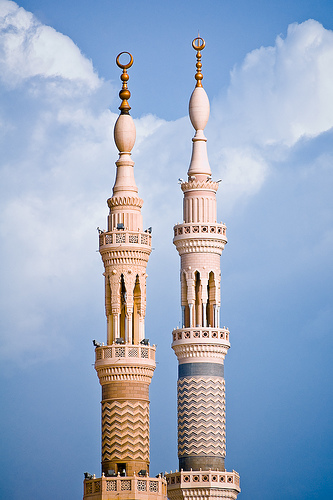Problems Confronting the Muslim world : The Plight of Womenfolk in Muslim Society
Problems Confronting the Muslim world : The
Plight of Womenfolk in Muslim Society
By
Dr. Said Ramadan,
Director, Islamic Centre, Geneva
The second problem is that of the position of the womenfolk in Muslim society. In this regard also, as in regard to our social life as a whole, we are in a state of complete chaos, hotchpotch of competing forces; the remaining Islamic influence, our inherited traditions and extraneous influences which have crept into our life as a result of the enveloping wave of blind imitation of the West. This has created a myriad of problems in Muslim society, among which deserving of special attention is the problem of womenfolk. This is not so merely because women constitute something more than half the community. It is particularly pressing because it is a problem, which affects the family, the very basis of our social life, and because of the deep and inherent relationship that it has with those factors, which make for the cohesion of our society. It is in fact a problem that affects in its ramification most of aspects of our national orientation.
It is strange that we Muslims should neglect the important position of women. The Shariah has placed such emphasis on it in connection with the lives of those great men whom God entrusted with high tasks and whom He chose as the recipients of His revelation-those noble souls ordained to deliver God's message to mankind. In the story of Moses it is his mother, Pharaoh's wife and the daughter of Madyan who constitute great figures. In the story of Jesus, his virtuous mother is a great pillar of the story. The principal nobility and virtue among those who stood faithfully by the side of Muhammad (SAWS) in his apostolic mission was Khadijah, the compassionate and noble lady of Mecca. Indeed, the numerous verses of the Qur'an and the large number of prophetic traditions which speak of woman's status and of her rights and responsibilities, are quite sufficient to determine our attitude towards womanhood. The Holy Qur'an refers to their position while comparing it with the position of men in the sight of God and proclaims it to be one of complete equality:
"I shall not let the work of worker, male or female, be lost. You issue from one another."(11: 195). On other occasion it mentions the rights and duties of women as akin to those of men before mentioning man's administrative leadership of the family. "And they (women) have rights similar to those (of men), according to what is equitable, and men are a degree above them." (11:228). On still another occasion we find Islam pointedly stressing gentleness and good behavior in the treatment of women. Said the Prophet in his last address:
"I advise you to be good to women."
It is not my intention to discuss the position of womenfolk in all its ramifications. What I have to say will be quite brief, but nevertheless of serious importance, for the time has come when we should be very clear as a number of questions relating to this problem and attention to the solution thereof. It should be very clear in our minds that woman, according to Islam, is intrinsically like her male partner. She is a human being endowed with the same essence of nobility, which is shared by the whole human species. As far as human quality is concerned, men and women are absolutely alike: "O mankind! Revere your Lord, Who created you from a soul and from that created its mate, who thereof brought forth multitude of men and women." (4:1).
Moreover, each one, man and woman, will be held responsible for his own individual self: "….and every one of them will come to God, on the day of Resurrection, alone." (19:95). This means that those who either believe, or whose behavior reveals the unconscious concept that woman is an inferior being who has to be subjugated, that she is merely an instrument for the self-indulgence of man-such people require a radical reorientation of their attitude towards womankind. Such people, by clinging to such unhealthy ideas, or through such unhealthy conduct, are grossly distorting God-given human nature and killing potentialities of thought, feeling and vitality in their partners of life.
It should also be clear that the unbridled self-will of certain women in other societies, or of those of our own who blindly imitate them, should not be countered by extremism on our part: by imposing on women what God has not imposed upon them, or by forbidding them what God has not forbidden. We should remember that women in the western world began to lean in the wrong direction from definite causes, at least some of which were undoubtedly related to social injustices, under the dead weight of which, women had languished for so long, imprisoned and ignorant, with no will or personality of their own. They revolted against this injustice-and this revolt was a completely natural and genuine one. Then they began to lean in the wrong direction, becoming stubborn and headstrong. The same type injustice continues to have its strong-holds in our own society, where there are still people, though very few, who are proud of the fact that since the wedding night when their wives were driven home, they have not seen the street once. There are still other who consider themselves entitled to beat their wives if they dare to disagree with their views and advance an opinion of their own. Again, there are those who spend year after year with their wives and daughters without sitting down to discuss a problem with them or attempting to make them share their views.
Who would claim that any of these has anything to do with Islam? On the contrary, it is Islam that elevated women to heights of prestige, which have neither precedent nor parallel in human history. At a time when womanhood in the West was held in such a state of impurity that even a woman's was an evil pollution of the Bible, Qur'anic manuscripts were held in the trust of the Lady Hafsa at Medina. At a time when Romans held conference to debate whether woman was a "person" or a "thing", Muhammad (SAWS) stood up to declare that "women are but the sisters of men" and to shatter the pre-Islamic era of darkness and injustice, so that a woman could argue with the Holy Prophet in the courtyard of the mosque and say, "I have been deputed to you on behalf of woman!" Indeed, it was Islam which, for the first time, established the status of women full-fledged members of human society and granted them the right to owe whatever they earned since the Qru'an proclaimed: "Unto men of fortune from that which they have earned, and unto women of fortune from that which they have earned." (4:32).
Whatever standards of decency Islam has laid down in matters of dress and behavior between man and woman, they are all with the sole intention of ensuring the sanctity of the home and the inviolability of marital intimacy. Not one of these standards could ever imply an attitude directed towards humiliation of woman as regards her social status or her role in her relationship with man. When a newly married girl complained to the Prophet that her father had chosen her husband without consulting her, he immediately gave her permission to annul her marriage, to which she replied: "I have no personal objection to my husband and I accept him, but I wanted it to be known that a father has no right to impose a husband upon his daughter without her consent." In contrast to the then prevailing ignorance and plutocracy of tribal traditions, Muhammad (SAWS) enjoined the quest of knowledge as an integral part of faith, for men and women alike. He praised highly the women of Ansar with: "Blessed be those whose modesty never prevented them from seeking knowledge." Far from being rough or rude, Muhammad's (SAWS) consciousness of women's tenderness and delicacy was so intense that even in the impelling harshness of the desert, he gently appealed to Anjashah, the caravan driver: "O Anjashah, slow down a little, for thy camels are carrying glasses!"
This is only a glimpse of Islam: thus, how could we possibly be justified in so grossly distorting it by all sorts of misconceived traditions and beliefs? What could be more unjust, whether to Islam or to ourselves, than to misrepresent as we do, or rather to deform the beautiful features of Islam? And consider when?-at a time when we are encountering the movement of so-called progress and emancipation, which is advancing like a storm and wreaking havoc in our lives.
It is imperative to realize that the really weak points in our society are those that provide genuine cause for feminine revolt, which can subsequently take an extremist turn and ultimately lead to unbridled feminine self-will. If we are serious about resisting this unhealthy trends, it is our duty to call a stop where God has done so, and combat the deceptive, misleading elements we are encountering by adhering to what God has laid down for us. We should neither depart from anything, which God has decreed out of weakness or compromise, nor add anything to it from extremism and severity.
These things are relevance for all Muslims. But they are of particular importance to those who are actively devoted to the revival of Islam. I fervently wish that such people would put these ideas into effect; would stop at the point where the Shariah stops, and have the courage to proclaim and insist on what God has made binding on us, and that alone. This is essential in creating a strong wall around whatever of virtue and purity remains in our society. It is to be hoped that by so doing the workers for the cause of Islam will have created a real barrier, one strengthened by the word of God and His Prophet, against the sweeping, devastating storm which threatens Islam today. For, if matters are not clarified, and confusion is allowed to reign as it does today, if the good aspects are not separated from the bad, both in theory and by good example, the result of this confusion is bound to be this: the good elements will be mistaken for bad, and both will be swept away by the rising storm. This will not be in the least surprising. For there is neither a divine code which is being sincerely adhered to, nor is there any social system based on experience and clarity of outlook, and God has not appointed a gendarme to regulate the conflicting traffic of good and evil.
A further consideration in this connection is that many of our women, like our men, do not possess an adequate knowledge of Islam. The picture of Islam they have deep in their minds is a confused and distorted one. It is the picture of Islam as it is practiced in our countries. In addition to this, there is a dire absence of religious discipline among our people, while on the other hand there is the aggressive advance of moral laxity in our society, fully armed with formidable weapons: the attraction of the western culture which has cultivated deep down in the hearts of our young men and women an admiration for its glamour and its pattern of life, also admiration of their civilization sown in our hearts by the pioneers of this culture: magazines, radio broadcasts, films etc. And above all, it is armed with temptations, the potential response to which has been planted by God in the nature of every man and woman as the Qur’an says: Decorated for mankind is love for joys (that come) from women (III : 14)
All this requires that our collective attitude to the solution of this problem should be based on a full consideration of the magnitude of the impact of the cultural invasion of the West on those who are exposed or have fallen victim to it. This should be borne in mind particularly when the problem requiring a solution concern women, for with women the emotional factors are predominant. Hence, leniency itself is not enough. The approach to reform should be based on a careful distinction between what is good and what is bad.
Moreover, we should not begin by condemning people for lacking honour and decency by falling into some of the widespread errors, for instance, the violation of limits in matters of dress, etc. For not every unveiled woman is a bundle of vices and immodesty, nor is every veiled woman a paragon of virtue and piety!
I do not want what I am saying here to be underestimated, for incautious accusations against people and harshness in rendering advice has most seriously damaged the cause of Islam among women. This has unfortunately created a gulf between those who work for Islam and many basically good women. I have countless practical instances of this, although our sisters can recount many more. A large number of them, young and old, whose reactions against wrong traditions or clumsy approaches first put them in firm opposition to Islam and its workers, have subsequently become among the best champions of the cause once they were approached in a proper, understanding and decent manner.
(From the book "Three major problems confronting the Muslim world" published by Geneva Islamic Centre, also published in weekly Young Pakistan, Dhaka on September 24, 1968 )








